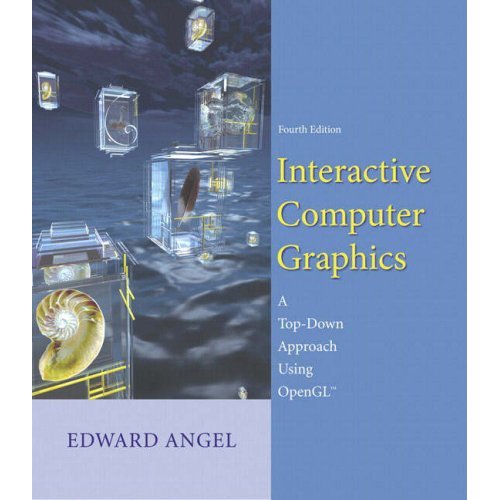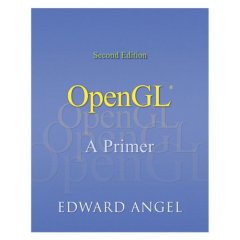 Edward Angel, Interactive
Computer Graphics: A Top-Down Approach Using OpenGL, Fourth Edition,
Addison Wesley,
2006, ISBN 0-321-32137-5.
Edward Angel, Interactive
Computer Graphics: A Top-Down Approach Using OpenGL, Fourth Edition,
Addison Wesley,
2006, ISBN 0-321-32137-5. Edward Angel, OpenGL:A
Primer, Third Edition, Addison Wesley,
20068, ISBN 0-321-39811-4.
Edward Angel, OpenGL:A
Primer, Third Edition, Addison Wesley,
20068, ISBN 0-321-39811-4.| INSTRUCTOR: | Dr. Rodrigo A. Obando |
| OFFICE: | Center for Commerce and Technology, Room 453 |
| OFFICE HOURS: | MTWRF 9:00 AM - 10:00 AM, 2:00 PM – 3:00 PM and by appointment; |
| PHONE: | (706) 568-5374 |
| E-MAIL: | Obando_Rodrigo@columbusstate.edu |
Introduction to the input, construction, storage, retrieval, manipulation, alternations, and analysis of computer graphics objects. Graphics computer hardware, graphics primitives, two-dimensional and three-dimensional viewing and transformations, basic modeling. Prerequisite: CPSC2108 with a grade of C or better.
 Edward Angel, Interactive
Computer Graphics: A Top-Down Approach Using OpenGL, Fourth Edition,
Addison Wesley,
2006, ISBN 0-321-32137-5.
Edward Angel, Interactive
Computer Graphics: A Top-Down Approach Using OpenGL, Fourth Edition,
Addison Wesley,
2006, ISBN 0-321-32137-5. Edward Angel, OpenGL:A
Primer, Third Edition, Addison Wesley,
20068, ISBN 0-321-39811-4.
Edward Angel, OpenGL:A
Primer, Third Edition, Addison Wesley,
20068, ISBN 0-321-39811-4.You will need the following software for this course:
Note: If you are using Windows XP, you must use the Professional version of Windows XP for this course. If you have the Windows XP Home edition, you must upgrade to the Professional edition. You can do so for free by downloading Windows XP Professional from the MSDNAA site at:
http://msdn08.e-academy.com/columbusstate_cs
If you live or work in the local Columbus area, you can drop by the Department of Computer Science on the fourth floor in the new Center for Commerce and Technology building and check out a copy of the CDs for Visual Studio .NET 2005, and/or Windows XP Professional. If you do not live or work in the local Columbus area, you may either download the software or request that the CDs be mailed to you.
Shortly after the semester begins, you will receive a message that describes a process for downloading or checking out software from the Department of Computer Science as part of the MSDNAA agreement. Windows 2000/XP Professional, Visual Studio 2005 or above will be among those available. Once the software has been downloaded, it must be installed in accordance with the MSDNAA Agreement (http://www.msdnaa.com/programusage.aspx).
As an alternative to downloading the software, you may request the software CDs be mailed to you. Simply send an e-mail message to our department secretary Dianne Phillips (cs@columbusstate.edu). Include in the message your name, address, and the name and number of this course. Once you have received the CDs, you must install the software in accordance with the MSDNAA Agreement ( http://www.msdnaa.com/programusage.aspx). Once you have installed the software, you must place the CDs back in the box they came in (or a suitable container) and return them to the Department of Computer Science. There should be a return label in the box the CDs weren't sent to you in, but you will have to pay for the return postage.
Student Web Server Space There may be times when you will want to use an actual Web server in response to discussion questions, for programming assignments, or for your final project, particularly when creating Java applets or Web-based interfaces. All currently enrolled CSU students (including online students) can request free Web server space on the CSU student Web server. Simply go to http://students.columbusstate.edu and click on the "Free Web Pages" icon, then click on the link to request the account. Under normal circumstances, the account and space will be created in a matter of seconds. If you experience any difficulties during the account request process, please e-mail the CSU webmaster (webmaster@columbusstate.edu). Technical Support You must have the ability to administer your own computer system(s), and to install and configure your own software. Ordinarily, I can only provide limited support.This course is being offered through WebCT. You can access WebCT at:
http://webct.columbusstate.edu/
At this page, click on the "Log on to" link to activate the WebCT logon dialog box, which will ask for your WebCT username and password. Your WebCT username and password are:
Username: lastname_firstname
Password: XXXXXX
where "XXXXXX" is the day, month and year of your birthday ddmmyy.
If you try the above and WebCT will not let you in, please use the "Comments/Problems" link at the bottom of the WebCT home page to request help. If you are still having problems gaining access a day or so after the class begins, please e-mail me.
Once you've entered WebCT, you will see a list of courses you have access to. The CPSC 6118 course is listed as "Graphical User Interface Development." Below this, you should see my name as the instructor. You may also see new discussion postings, new calendar postings, and new mail messages. Clicking on the name of the course will take you to the course's home page. If you don't see the "Graphical User Interface Development" course in the list, please e-mail me directly since I control that part of the WebCT environment.
Once you have clicked on the course's name and accessed the particular course itself, you will find a home page with links to other sections and tools, and a menu on the left-hand side. The first thing you should do is read the "Welcome (read first)" information. This information will give you a feel for what's available in the particular WebCT classroom environment and explain in more detail how the course will work, including an initial step-by-step description of how to get started in the course. Once you've read this information, please feel free to explore the other areas.
This course will consist of 3 programming assignments, and a final project. On a weekly basis, you will need to:
| A | 90% - 100% | B | 80% - 89% |
| C | 70% - 79% | D | 60% - 69% |
You are responsible for all class work missed, regardless of the reason for the absence(s). Late assignments will not be accepted. No makeup exams or quizzes will be given, so please make sure you are present for all exams/quizzes. Refer to the CSU Catalog (http://aa.columbusstate.edu/advising/a.htm#Absence Policy) for more information on class attendance and withdrawal.
Academic dishonestyAcademic dishonesty includes, but is not limited to, activities such as cheating and plagiarism (http://aa.columbusstate.edu/advising/a.htm#Academic Dishonesty/Academic Misconduct). It is a basis for disciplinary action. Any work turned in for individual credit must be entirely the work of the student submitting the work. All work must be your own. [For group projects, the work must be done only by members of the group.] You may share ideas but submitting identical assignments (for example) will be considered cheating. You may discuss the material in the course and help one another with debugging; however, any work you hand in for a grade must be your own. A simple way to avoid inadvertent plagiarism is to talk about the assignments, but don't read each other's work or write solutions together unless otherwise directed by your instructor. For your own protection, keep scratch paper and old versions of assignments to establish ownership, until after the assignment has been graded and returned to you. If you have any questions about this, please see your instructor immediately. For assignments, access to notes, the course textbooks, books and other publications is allowed. All work that is not your own, MUST be properly cited. This includes any material found on the Internet. Stealing or giving or receiving any code, diagrams, drawings, text or designs from another person (CSU or non-CSU, including the Internet) is not allowed. Having access to another person’s work on the computer system or giving access to your work to another person is not allowed. It is your responsibility to prevent others from having unauthorized access to your work. No cheating in any form will be tolerated. Penalties for academic dishonesty may include a zero grade on the assignment or exam/quiz, a failing grade for the course, suspension from the Computer Science program, and dismissal from the program. All instances of cheating will be documented in writing with a copy placed in the Department’s files. Students will be expected to discuss the academic misconduct with the faculty member and the chairperson. For more details see the Faculty Handbook: http://aa.columbusstate.edu/faculty/FacHandbook0203/sec100.htm#109.14 and the Student Handbook: http://sa.columbusstate.edu/handbook/handbook2003.pdf You are expected to review the TSYS Department of Computer Science’s Academic Dishonesty Policy - (http://csc.columbusstate.edu/policy/Academic-Dishonesty-Policy.html) |
CSU ADA statement
If you have a documented disability as described by the Rehabilitation
Act of
1973 (P.L. 933-112 Section 504) and Americans with Disabilities Act
(ADA) and
would like to request academic and/or physical accommodations please
contact
Joy Norman at the Office of Disability Services in the Center for
Academic
Support and Student Retention, Tucker Hall (706) 568-2330, as soon as
possible.
Course requirements will not be waived but reasonable accommodations
may be
provided as appropriate.